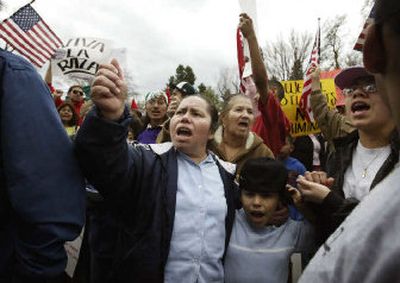Rallying for rights

YAKIMA – The U.S. and Mexican flags flew together on the streets of Yakima on Sunday as hundreds of mostly Latino demonstrators marched through the city center in support of immigrant rights and in opposition to legislation they see as anti-immigrant, anti-worker and racist.
Even more prominent was the red-and-black flag of the United Farm Workers union, a reminder of the importance of Latino immigrants to the agricultural economy of central Washington.
“Latinos are the base of the work force here,” said Uriel Iniguez, executive director of the Washington state Commission on Hispanic Affairs, the son of immigrants and one of five siblings to graduate from Eastern Washington University, which recently hired a Latino president.
“They are truly the infrastructure, not just of the agricultural economy, but also of economic development, small business, construction and service industries,” Iniguez said.
As many as 2,000 students, farmworkers, parents and children marched peacefully, chanting, “A people united will never be defeated,” and carrying placards in English and Spanish that read, “We are all immigrants” and “The border crossed us.”
Many belong to families who have been American citizens for generations; others have only just arrived, looking for work and a better life for their children.
All were part of a wave of immigrants and their supporters who have demonstrated recently across the nation against legislation that has been approved by the U.S. House of Representatives to criminalize undocumented workers, penalize those who hire them and build a wall along the southern border.
Some House Republicans see immigration as a security issue, arguing that tougher border rules will prevent terrorists from entering the country. Others, such as Rep. Dana Rohrabacher, R-Calif., argue that it also is an economic issue, with migrants underbidding U.S. workers for jobs and driving down salaries.
“We do not need more people from for-reign countries coming in, taking the jobs of Americans. … I say let the prisoners pick the fruits,” Rohrabacher said on Capitol Hill last week as House members attacked the Senate bill, according to the Associated Press.
The House bill also prompted marches Saturday and Sunday in Wenatchee and Pasco. Many students in Yakima, Wenatchee, Pasco, Monroe and Mount Vernon, Wash., walked out of class last week to protest the bill.
One Yakima marcher, Miguel Rodriguez, a student at Yakima Valley Community College and a member of MENChA, a Latino student group, said he fears such legislation would give local police the authority to enforce immigration law.
“We understand that this is America, and we are not asking for the borders to be open,” said Rodriguez, the son of a production supervisor at a Mattawa vineyard. “We are asking for comprehensive immigration reform that gives us a chance to become citizens and get an education.”
According to Jose Alamillo, professor of comparative ethnic studies at Washington State University, the nation has reached a critical moment when immigrants are beginning to speak up and “are now being heard.”
“We’re not here to take your job,” Alamillo said during the march. “We’re here to contribute to your country.”
Dismissing the House version of immigration reform as “draconian,” he also found fault with the Senate version, which would permit guest workers. That bill could be voted on by the full Senate this week. Such legislation, Alamillo said, would create a two-tiered work force. The United States has already seen in its history the abuses, “in terms of wages and living conditions,” of the bracero program, which brought in migrant workers during World War II.
“There is nothing in the Kennedy-McCain bill to protect against these abuses,” he said, adding that any serious immigration reform must include some form of “earned legalization.” This would include what is essentially a fine for living in the United States illegally and the right to apply for citizenship in the future.
Otherwise, Alamillo said, the Republican Party will have “given up on the Latino vote.”
Also marching Sunday was one of Alamillo’s students, Manuel Vega, a WSU senior and first-generation U.S. citizen whose parents work in Chelan County fruit-packing houses. He said he came to Yakima in support of the community and in protest against a “quick-fix” immigration bill.
“It’s time that immigration reform is instituted, but not this,” Vega said of the House bill. “It’s criminalizing someone who came here for work.”
The march ended where it began, at Miller Park just west of the city center. As rain started to fall on the crowd gathered around the park gazebo, speakers representing the farmworkers union, students and community leaders called for solidarity, and then a moment of silence “for all those who died crossing the border and all the Latino soldiers who have died in Iraq.”